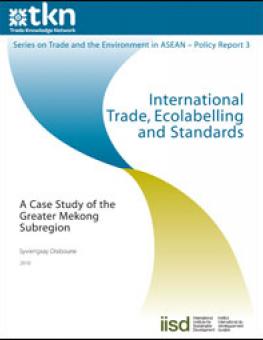
International Trade, Ecolabelling and Standards: A case study of the greater Mekong subregion
Environmental labelling, or ecolabelling, and standards have been considered as "trade positive" tools for the business community in order to comply with targeted consumers' requirements and develop a good image for their products and services in order to guarantee market access.
However, in developing countries, where the technology systems needed to comply with environmental requirements are costly to apply, ecolabelling often acts as a barrier to trade. This report discusses this issue as it affects the ASEAN region, with particular reference to the Greater Mekong Subregion (GMS), where less ecolabelling is applied and trade without labelling is still practised.
Intraregional trade generally still needs to come to grips with environmental issues, so a concrete policy needs to be developed and applied within the region with regard to ecolabelling and standards.
Key points:
-
In most GMS member countries, the development of environmental standards and labelling is still in its initial stages. The majority of the voluntary applications of ecolabelling and environmental standards in the GMS are in responses to the stringent environmental regulations in developed countries.
-
Given the export-oriented ecolabelling system in the GMS, most ecolabels are primarily related to industrial or manufacturing products, with only a small handful of ecolabels being attached to primary or natural-based products.
-
The reasons for the minimal use of environmental standards and ecolabelling in the region include: (1) the unfamiliarity of policy-makers and economic actors with environmental issues; (2) the export-oriented nature of standards and ecolabelling utilization, which neglects the environmental impact of products that are consumed in domestic markets; (3) the complexity and high costs associated with the implementation of the system; and (4) the slow progress of cooperation on environmental matters at both the GMS and the wider ASEAN levels.
Key recommendations:
-
The GMS and the wider ASEAN need to build a culture of environmental consciousness through, among other things, the expansion of public capacity building.
-
It is important to build an ecolabel culture for domestic consumers, as this would help to shift the utilization of environmental standards and ecolabelling in trade-related issues from being mandatory to being voluntary.
-
There should be systemic and institutional building up of national standards and ecolabelling through the development of national standards bodies that would eventually be upgraded to comply with international standards and ecolabelling requirements.
-
The knowledge of policy-makers at both the GMS and ASEAN levels about the linkages between trade and the environment should be improved so as to enable both subregional and regional architectures to undertake proactive steps to deal with trade growth, on the one hand, and proper environmental protection, on the other.
You might also be interested in
Tree Planting for Climate Resilience in Freetown, Sierra Leone
This assessment presents the economic valuation of tree planting efforts in Freetown, Sierra Leone, including planting costs, added benefits, and avoided costs.
Sustainable Asset Valuation of Sherwan Hill Adventure Park in Abbottabad, Pakistan
This report analyzes the social, economic, and environmental benefits of the Sherwan Hill Adventure Park in Pakistan.
December 2024 | Carbon Minefields Oil and Gas Exploration Monitor
In November 2024, 23 oil and gas exploration licences were awarded across five countries, with Russia granting the licences that account for the largest portion of embodied emissions.
Toward a Coherent, Transformative Approach to Financing Sustainable Development, Climate, and Nature
Four key proposals for the Fourth Financing for Development Conference (FfD4) to create an integrated, equitable approach to financing climate, nature, and development goals.